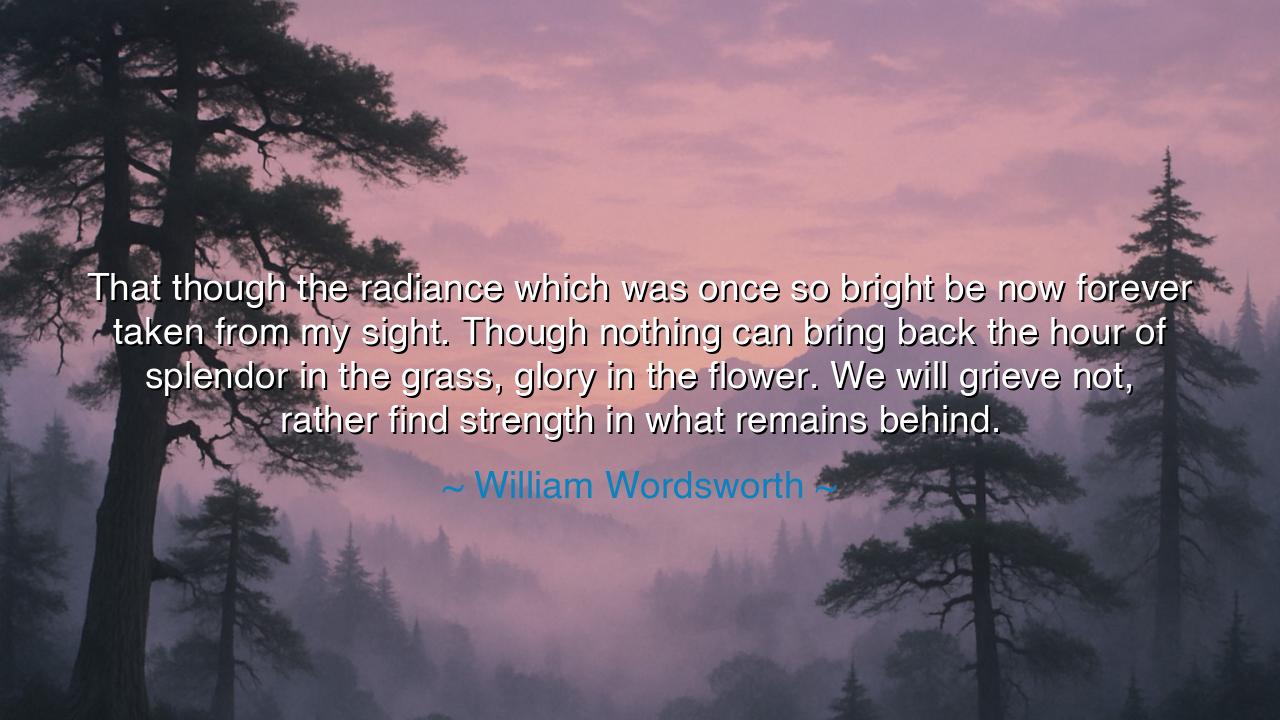
That though the radiance which was once so bright be now forever
That though the radiance which was once so bright be now forever taken from my sight. Though nothing can bring back the hour of splendor in the grass, glory in the flower. We will grieve not, rather find strength in what remains behind.






Hear the timeless voice of William Wordsworth, who in his Ode: Intimations of Immortality from Recollections of Early Childhood spoke these immortal lines: “That though the radiance which was once so bright be now forever taken from my sight. Though nothing can bring back the hour of splendor in the grass, glory in the flower. We will grieve not, rather find strength in what remains behind.” In these words he gives us not only lament, but wisdom, teaching us how to face the passing of youth, the fading of innocence, the loss of moments that will never return.
The radiance he names is the light of childhood—the wonder that once shone upon the world, making even common things seem holy. But as time advances, that brightness dims. The splendor in the grass, the glory in the flower—these are the fleeting joys of early life, moments of pure delight, unshadowed by care. Wordsworth acknowledges with sorrow that they cannot be reclaimed; the hour is gone, the vision lost. Yet he does not remain in mourning. Instead, he declares that we must not only grieve, but also draw strength from what endures.
The ancients too recognized this truth. The philosopher Heraclitus spoke of the river that can never be stepped into twice, for the waters are always changing. Childhood, like a flowing stream, passes swiftly, and its splendor is gone. Yet Heraclitus also taught that change itself is the essence of life, and that wisdom lies in embracing it. Wordsworth echoes this: though the bright past may vanish, it leaves behind gifts—memory, insight, tenderness—that become our sources of strength in later years.
Consider, O listener, the story of Helen Keller. As a child she knew the radiance of sight and sound, but illness took them from her forever. She could have remained in grief for what was lost, the glory in the flower she could no longer see. But instead she found strength in what remained: the touch of her hand, the love of her teacher Anne Sullivan, the resilience of her spirit. From those remnants, she built a life of wisdom and inspiration, shining as brightly as any who could see the dawn.
Wordsworth’s words remind us that nostalgia, though natural, must not bind us in sorrow. To endlessly long for the past is to blind ourselves to the treasures that still remain. The radiance of childhood may fade, but in its place comes the deeper strength of maturity: compassion born of suffering, courage forged in trial, understanding deepened by time. These may lack the brightness of youth, but they carry a nobler light, steady and enduring.
The lesson is thus: accept loss without despair. When life takes away its brightness, do not cling to what is gone, but look instead at what has been left to you. Memory itself is a gift; lessons learned are a treasure; love that remains is a fortress. Grieve, yes, but let grief transform into gratitude and resolve. In this way, the soul is not diminished by passing time, but strengthened by it.
Therefore, O traveler of life, let Wordsworth’s wisdom be your guide. When the flowers of your youth fade, when the grass no longer glows with the same splendor, do not despair. Instead, look upon what remains—your experiences, your friendships, your wisdom—and draw strength from them. The past cannot be recovered, but it can be honored by the way you live in the present.
So remember: though the radiance may be taken from your sight, its warmth remains in your heart. Though the glory of the flower fades, its seeds live on, bearing fruit in later days. Grieve not, but find strength in what remains. For in that strength lies the true splendor—not of youth, but of a life lived deeply, and with wisdom.






AAdministratorAdministrator
Welcome, honored guests. Please leave a comment, we will respond soon